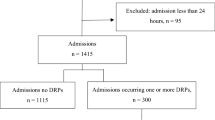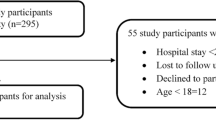Summary
The association between hospital admission and drug-related problems was evaluated in 285 consecutive admissions to two medical wards in a Swedish university hospital. Standardised definitions and criteria for causality were used. A drug-related problem was judged to have been the main reason for admission of 36 patients, and a strongly contributory reason for 9. These 45 patients comprised 16% of all patients, and 19% of those receiving medication prior to admission. For 19 patients the problem was considered to be failure to achieve the desired therapeutic effect. 11 of these 19 took less medication than prescribed, and an inadequate dose had been presented for the other 8 patients. In 26 patients there was an excessive or otherwise adverse effect. In 10 it was an intentional or accidental poisoning, and 16 had an adverse drug reaction. Non-compliance with the prescribed regimen caused almost half of the drug-related admissions: 11 took too little and 10 took too much of the prescribed drugs. The majority of the other problems could probably have been prevented by better application of pharmacokinetic principles to the prescribing.
Similar content being viewed by others
References
Seidl LG, Thornton GF, Smith JW, Cluff LE (1966) Studies on the epidemiology of adverse drug reactions: III. Reactions in patients on a general medical service. Bull Johns Hopkins Hosp 119: 299–315
Smith JW, Seidl LG, Cluff LE (1966) Studies on the epidemiology of adverse drug reactions: V. Clinical factors influencing the susceptibility. Ann Intern Med 65: 629–640
Hoddinott BC, Gowdey CW, Coulter WK, Parker JM (1967) Drug reactions and errors in administration on a medical ward. Can Med Assoc J 97: 1001–1006
Ogilvie RI, Ruedy J (1967) Adverse reactions during hospitalization. Can Med Assoc J 97: 1445–1450
Ogilvie RI, Ruedy J (1967) Adverse drug reactions during hospitalization. Can Med Assoc J 97: 1450–1457
Borda IT, Slone D, Jick H (1968) Assessment of adverse reactions within a drug surveillance program. JAMA 205: 645–647
Hurwitz N, Wade OL (1969) Intensive hospital monitoring of adverse reactions to drugs. Br Med J 1: 531–536
Gardner B, Watson LJ (1970) Adverse drug reactions: A pharmacist-based monitoring system. Clin Pharmacol Ther 11: 802–807
Levy M, Nir J, Birnbaum D, Superstine E, Eliakim M (1973) Adverse reactions to drugs in hospitalized medical patients. Isr J Med Sci 9: 617–626
Miller RR (1973) Drug surveillance utilizing epidemiologic methods: A report from the Boston Collaborative Surveillance Program. Am J Hosp Pharm 30: 584–592
Smidt NA, McQueen EG (1972) Adverse reactions to drugs: A comprehensive hospital in-patient survey. NZ Med J 76: 397–401
Hurwitz N (1969) Admissions to hospital due to drugs. Br Med J 1: 539–540
Caransos GJ, Stewart RB, Cluff LE (1974) Drug-induced illness leading to hospitalization. JAMA 228: 713–717
Miller RR (1974) Hospital admissions due to adverse drug reactions: A report from the Boston Collaborative Drug Surveillance Program. Arch Intern Med 134: 219–223
McKenney JM, Harrison WL (1976) Drug-related hospital admissions. Am J Hosp Pharm 33: 792–795
Beermann B, Biörck G, Groschinsky-Grind M (1978) Admissions to a medical clinic due to drugs and intoxications. Läkartidningen 75: 959–960
Karch FE, Lasagna L (1977) Toward the operational identification of adverse drug reactions. Clin Pharmacol Ther 21: 247–254
Levy M, Kewitz N, Altwein W, Hillebrand I, Eliakim M (1980) Hospital admissions due to adverse drug reactions: a comparative study from Jerusalem and Berlin. Eur J Clin Pharmacol 17: 25–31
Haynes RB, Taylor DW, Sackett DL (eds) (1979) Compliance in health care. Johns Hopkins University Press, Baltimore
Karch FE, Lasagna L (1975) Adverse drug reactions. A critical review. JAMA 12: 1236–1241
Karch FE, Smith CL, Kerzner B, Mazullo JM, Weintraub M, Lasagna L (1976) Adverse drug reactions — a matter of opinion. Clin Pharmacol Ther 19: 489–492
Koch-Weser J, Sellers EM, Zacest R (1977) The ambiguity of adverse drug reactions. Eur J Clin Pharmacol 11: 75–78
Bergman U, Norlin A, Wiholm B-E (1979) Inadequacies in hospital drug handling. Acta Med Scand 205: 79–85
Bergman U, Wiholm B-E (1981) Patient medication on admission to a medical clinic. Eur J Clin Pharmacol 20: 1–7
Norell SE (1981) Accuracy of patient interviews and estimates by clinical staff in determining medication compliance. Soc Sci Med 15: 57–61
Alván G, Bertler Å, Eeg-Olofsson O, Karlsson E, Sjöqvist F, Tomson G (1975) Biological availability — a comparison of three phenytoin preparations. Läkartidningen 72: 2621–2623
Lund L (1974) Clinical significance of generic inequivalence of three different pharmaceutical preparations of phenytoin. Eur J Clin Pharmacol 7: 119–124
Hurwitz N (1969) Predisposing factors in adverse reactions to drugs. Br Med J 1: 536–539
Kampman JP, Mølholm Hansen JE (1979) Renal excretion of drugs. In Crooks J, Stevenson IH (eds) Drugs and the elderly. MacMillan, London, pp 77–87
Kramer MS, Leventhal JM, Hutchinson TA, Feinstein AR (1979) An algorithm for the operational assessment of adverse drug reactions. I. Background, description and instructions for use. JAMA 242: 623–632
Hutchinson TA, Leventhal JM, Kramer MS, Karch FE, Lipman AG, Feinstein AR (1979) An algorithm for the operational assessment of adverse drug reactions. II. Demonstration of reproducibility and validity. JAMA 242: 633–638
Leventhal JM, Hutchinson TA, Kramer MS, Feinstein AR (1979) An algorithm for the operational assessment of adverse drug reactions. III. Results of tests among clinicians. JAMA 242: 1991–1994
Author information
Authors and Affiliations
Rights and permissions
About this article
Cite this article
Bergman, U., Wiholm, B.E. Drug-related problems causing admission to a medical clinic. Eur J Clin Pharmacol 20, 193–200 (1981). https://doi.org/10.1007/BF00544597
Received:
Revised:
Accepted:
Issue Date:
DOI: https://doi.org/10.1007/BF00544597




